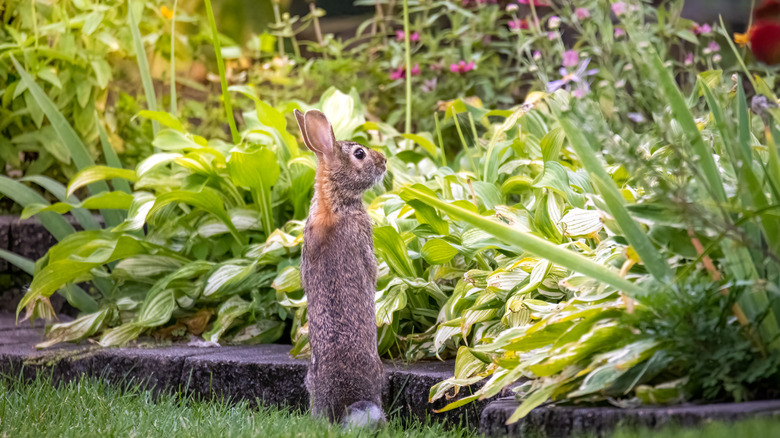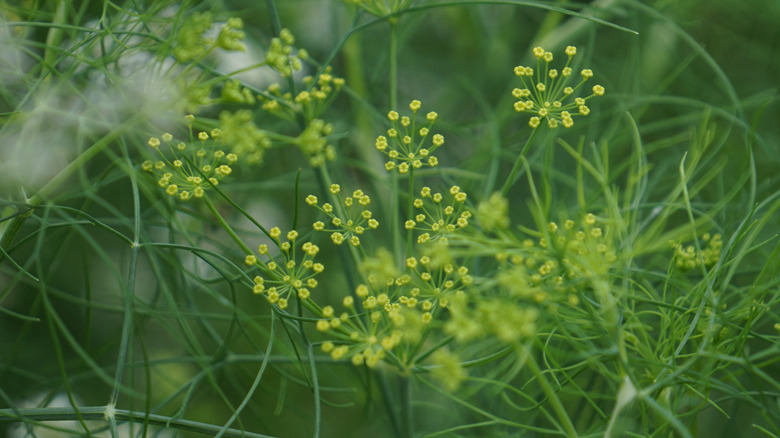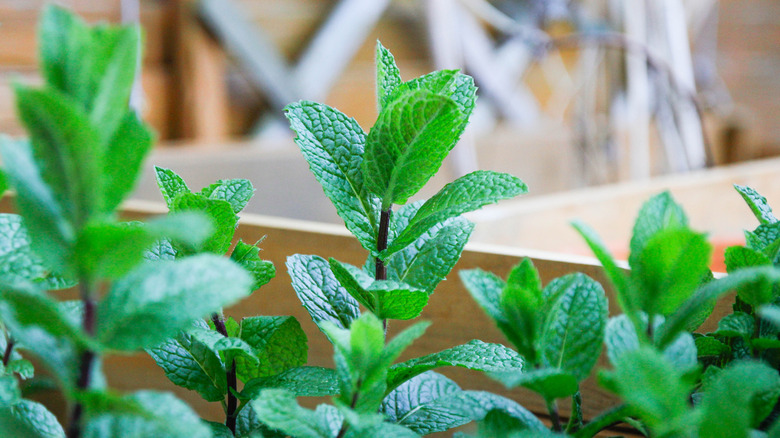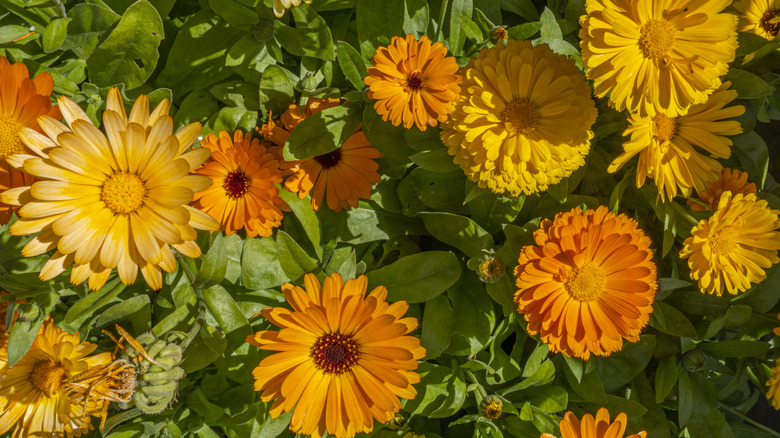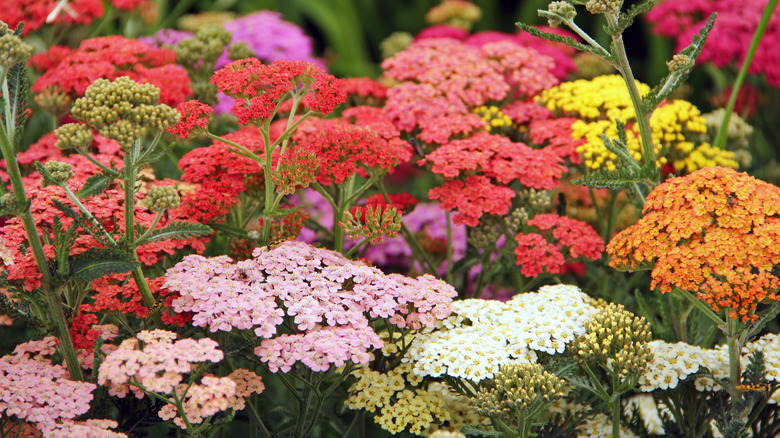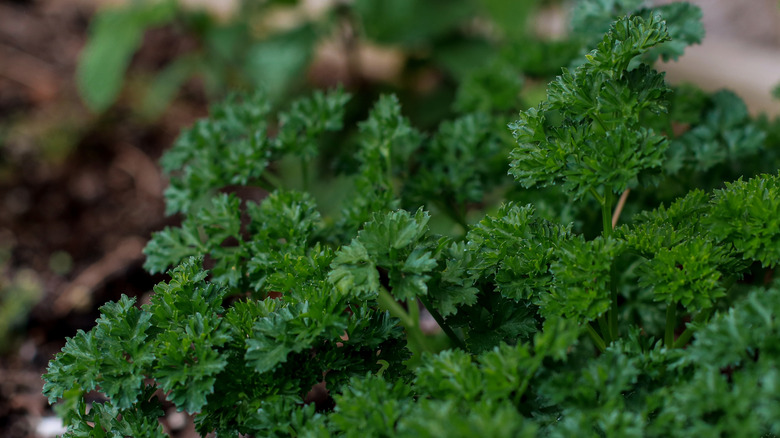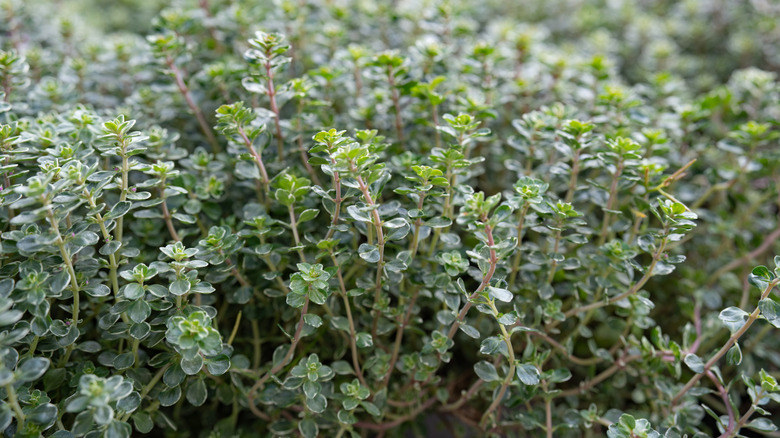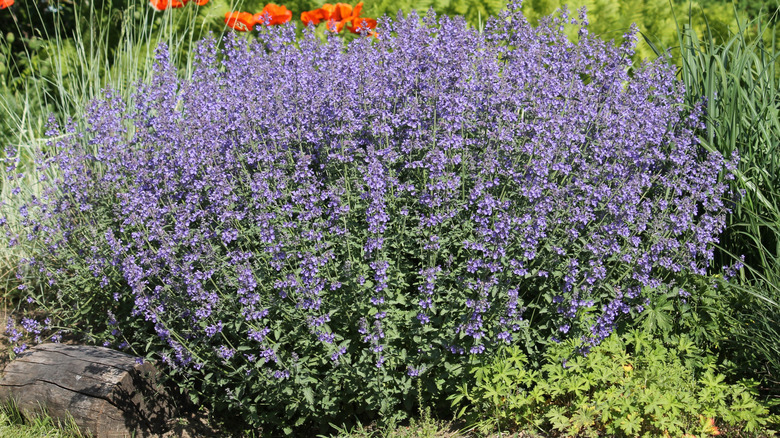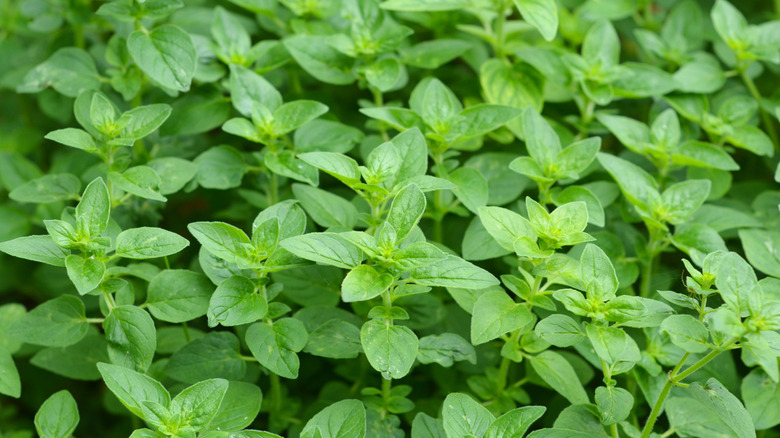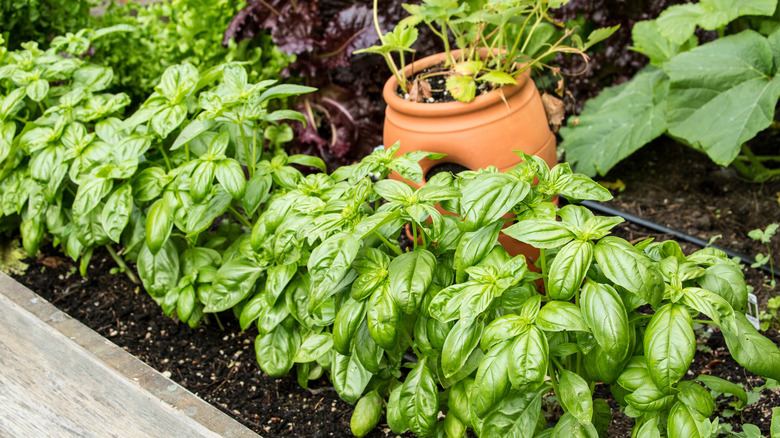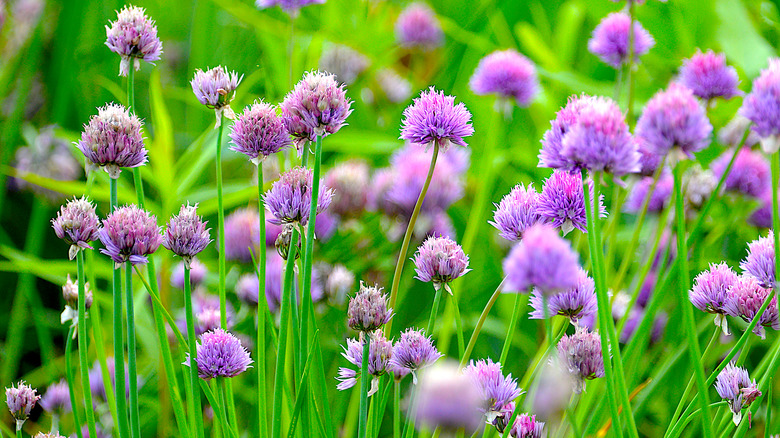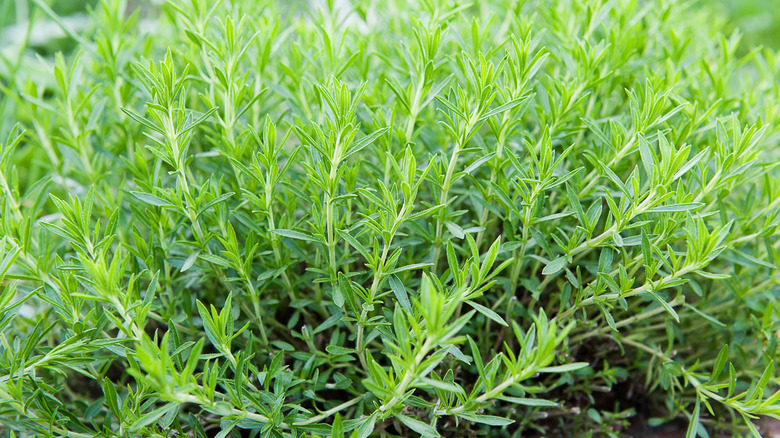11 Fast-Growing Herbs That Can Help Control Rabbits In Your Garden
There is perhaps nothing more heartbreaking for a gardener than planting an assortment of vegetables only to have them decimated by wildlife. I've had clients complain to me about rodent pests in their gardens and ask me for humane solutions. Personally, I've had vegetable plants eaten by squirrels, moles, woodchucks, and rabbits, and I have to say rabbits tend to do the most damage (although nothing matches a woodchuck's zeal for eating every baby broccoli plant in sight). Keeping rabbits out of the garden can be somewhat challenging because they can burrow beneath fencing if they're determined. One easy and safe way to stop rabbits from munching on your veggie garden is to plant strongly scented, fast-growing herbs to repel them.
Like rodents, rabbits have a strong sense of smell, which helps lead them to your tasty greens and carrots. But certain scents are distasteful to them, particularly the strong scents of culinary herbs, and alliums like garlic, onions, and chives. Many gardeners plant herbs alongside veggies as companion plants to attract beneficial pollinators while repelling undesirable insects like mosquitoes. Growing these fragrant herbs in your garden also provides tasty herbs for cooking and will help keep rabbits from eating your produce.
Before adding herbs to your garden, make sure you're choosing the best setting for them. Herbs that tend to spread (like mint or lemon balm) should be grown in containers. Some herbs have specific soil needs, hardiness zones, or can tolerate more sun, so choose their locations accordingly, and add amendments as needed. Place shorter herb plants by walkways and taller herbs near taller veggies to deter those bunnies from snacking.
Dill
Dill (Anethum graveolens) is a popular culinary herb. Its feathery leaves have a unique scent, and it has attractive, delicate flower heads that add an airy beauty to the summer garden. It is technically hardy in USDA Zones 2 to 11, but usually grown as an annual in colder zones. You can sow seeds directly after the first frost in your garden: it likes full sun and well-drained soil. Due to its unusual pungent scent, dill makes a great rabbit deterrent, especially when planted among other strongly scented herbs like tarragon, chives, thyme, or basil.
Mint
There are many varieties of mint to grow in the garden — peppermint and apple mint are nice choices. Nearly all of them have fairly aggressive spreading tendencies. Do yourself a favor and grow mint in containers to keep it from taking over your garden. Rabbits are not fond of mint and will tend to avoid it, so placing small pots of mint in and around your vegetable garden will help deter rabbits from munching on your plants. Mint has a wide range of growing zones (USDA 3 to 9) depending on the specific variety.
Calendula
Calendula, also known as pot marigold, is a beautiful annual flower that grows quickly and easily from seed and also readily reseeds in the garden. It is often grown in herb gardens, owing to its medicinal properties, and is also a good rabbit deterrent due to its pungent scent. It's hardy in USDA zones 2 to 11 as an annual, but its tendency to reseed even in colder zones gives it a perennial presence in the garden. It grows well in containers or planted alongside your vegetable rows, adding sunny color. Collect the dried seeds to replant in spring.
Yarrow
Often thought of as a flower, yarrow (Achillea millefolium) is in fact classified as an herb for its medicinal properties. It's easy to grow in a sunny garden, not fussy about soil, and hardy in USDA zones 3 to 9. Yarrow attracts many beneficial pollinators to the garden. The basic white variety is well known and beautiful, but there are many newer cultivars in a range of vivid colors, including yellow, orange, pink, and red. Yarrow has a distinctive herby scent that rabbits are known to dislike, so this summer bloomer is a good addition to your vegetable garden.
Parsley
Curly parsley (Petroselinum crispum) is easy to grow from seed, and the seedlings tend to appear fairly quickly. Compared to flat-leaf parsley, the scent is stronger and more likely to deter rabbits: grow it alongside other rabbit-repelling herbs like basil and chives for a strongly scented, rabbit-proof barrier. This cold-hardy herb (USDA zones 5 to 9) is a biennial, though usually planted as an annual. I sometimes plant it from seed in early spring, and then again in August for a late crop, as it loves cooler temperatures and does well into autumn.
Thyme
Thyme, a low-growing Mediterranean herb with tiny leaves, comes in many delicious varieties, including English, French, lemon, caraway, and creeping thyme. It's perfect for tucking into containers, for a small "spiller" plant, and alongside paths. Planting thyme (Thymus vulgaris) near your garden fence and entrance is a good strategy for keeping rabbits away, because they dislike its pungent aroma. Thyme has a range of growing zones depending on the variety, but most thyme is hardy in USDA zones 5 to 9.
Flowering catmint
Flowering catmint (Nepeta) comes in a number of varieties, all with violet-blue flower spikes that bloom all summer. It forms large clumps but can be divided frequently and easily in spring or fall. While it does tend to attract cats, its herby scent is distasteful to rabbits, so it makes a good perennial to plant in or near your vegetable garden. As a bonus, the nectar-rich flowers are pollinator magnets, attracting honeybees, butterflies, and hummingbirds. This easy-care plant is pest and disease-resistant and thrives in USDA growing zones 3 to 8.
Oregano
Oregano is a perennial herb that can form large clumping mounds in the garden. These can be divided about every two years. This fragrant flowering herb also repels mosquitoes and effectively deters rabbits with its strong, clean, herby scent. You can grow oregano in containers, but make sure it has plenty of root space if you plan to overwinter it in pots. Most varieties of oregano are hardy in USDA zones 4 to 10. Because it's one of the more strongly scented herbs (thanks to the abundant essential oil in the leaves), rabbits tend to steer clear of it.
Basil
Basil (Ocimum basilicum) is a favorite culinary herb to grow in summer. Its slightly peppery scent is uplifting and delicious. Cold hardy only in USDA zones 10 to 11, basil will tend to flower quicker in warm weather: snip off these flowers (you can toss them into salads) to help the plants produce more leaves. Basil grows easily from seed, and all varieties (Genovese, Greek, Thai, and more) do well in containers. Rabbits dislike the smell, so place a pot of basil at each corner of your garden to keep hungry critters at bay.
Chives
Chives are not only a delicious herb for cooking, but they also produce lovely, light purple flowers in summer. Once the flowers start to fade, cut them off, and the plant will keep going. You can snip off leaves as needed, and chives can also be dried. This member of the Allium family grows in perennial clumps (hardy in USDA zones 3 to 9) and normally needs dividing every few years. I like planting chives both in my veggie garden and my flower garden: The flowers attract bees and butterflies, but the pungent scent keeps mosquitoes away, and bunnies too!
Tarragon
French tarragon is a popular culinary herb with an unusual aroma that discourages rabbits: fresh, green, and savory with a tinge of anise and vanilla. It's one of a number of Mediterranean-region herbs that grow well as an annual in a sunny garden bed, and it's hardy in USDA zones 3 to 8. It's easy to grow from seed and is suitable for standard or raised garden beds or containers. Don't overwater it: tarragon prefers a well-drained, slightly dry soil environment.
